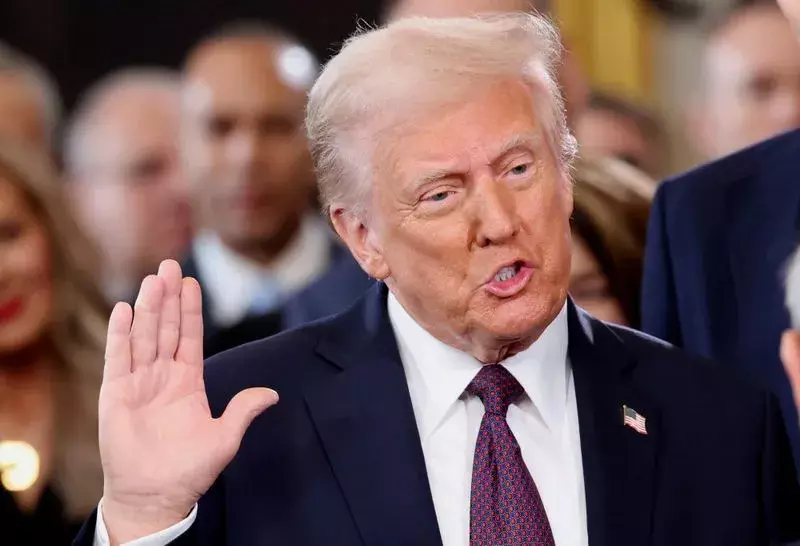Peacemaker Trump - Really?
From a bully to a peacemaker

What does Donald Trump mean when he says he wants to be a peacemaker ?
Israelis and Arabs alike believe this means the new US President is intent on securing the Nobel Peace Prize and all his policy moves from now will take this ambition into account.
In the capitals of the Middle East, from Ankara in the East to Doha, Tel Aviv, Riyadh and Cairo, the talk is all about the President’s ‘special team’ or task force set up with the sole aim of promoting Trump as a world leader worthy of the prestigious prize that was previously awarded to two of his predecessors, Jimmy Carter and Barack Obama.
Because he is so often portrayed as an uncompromising and unpredictable bully, Trump is now obsessing with refurbishing his image so that the world sees him as a global saviour who functions with the blessings of God.
In speeches both before and after the presidential election, Trump repeated his determination to end wars, not start them. These statements appeared to be directed at the Nobel committee responsible for choosing the recipient of the next peace award.
To achieve his goal he will need to tackle two immediate challenges. The first is the Gaza war, where he has already scored a victory by bringing a temporary halt to hostilities and a partial release of the Israeli hostages. By all accounts it was the immense pressure that Trump brought into play that resulted in last week’s ceasefire. All parties remember his warning that ‘all hell will break out’ if the hostages were not released by January 20. It was this threat that forced Israel and Hamas to agree concessions allowing the cease fire deal to materialise.
Trump’s second challenge is the Russia-Ukraine conflict that has been dragging on for more than two years. Following his inauguration, the US President declared the war was bad for Russia and bad for the Russian economy, necessitating immediate dialogue with Russian President Vladimir Putin. Trump has set himself a 100 day deadline for ending the Ukraine war.
His post inauguration speech to US military personnel was consistent with his declared aim of avoiding future wars. IF he is to be believed the US will now embark on building an all powerful army, stronger than any other army in the world, that functions as a deterrent rather than a front line combatant force.
In private conversations with world leaders, including Middle East rulers, Trump’s closest advisers admit he has not abandoned his ‘baby project’ to expand the ‘Abraham Accords’ that resulted in normalisation agreements between Israel and Arab states, including the United Arab Emirates (UAE) and Bahrein. Significantly missing from this package was the kingdom of oil rich Saudi Arabia that also houses the holiest shrines of Islam.
If the Saudis eventually agree to exchange ambassadors with Tel Aviv, this is expected to create a domino effect with most other muslim countries, such as Pakistan, Malaysia, Indonesia and maybe even Yemen following suit. During Trump’s first presidency it was an open secret that Israeli Prime Minister Binyamin Netanyahu secretly visited Saudi Arabia for face to face talks with the kingdom’s de facto ruler and Crown Prince Mohammed Bin Salman, referred to as MBS in the West.
American Jewish leaders who have met MBS playfully describe him as a ‘Zionist Arab’ who believes in Israel’s right to exist as the homeland of the Jewish people. In the past decade those Jews who felt unwelcome in Saudi Arabia suddenly evolved into frequent visitors to such Saudi cities as Riyadh, Jeddah and Dhahran. Gone are the days when the Saudi authorities turned a blind eye to local extremists targeting suspected supporters of Israel.
One of them was the late Osama Bin Laden, born in Saudi Arabia, who made no secret of his contempt for the Jews as he embarked on his global mission of ‘jihad’ or holy war against the infidels who threatened islam. Bin Laden was also the architect of the 9/11 attack on New York’s twin towers that resulted in nearly 3,000 deaths. US commandos were used to track and kill him in his Pakistani hideout in 2011.
However MBS’s new warmth towards Israel comes at a price. Both in public and in private the Saudi Crown Prince has repeated how the envisioned peace in the Middle East can only be achieved once a Palestinian state is established side-by-side with Israel. This declared goal of creating a Palestinian state is what has prevented other US presidents- not just Trump - from solving the 76 year old war between the Israeli jews and Palestinian Arabs.
Trump’s deal-of -the-century plan, which offers the Palestinians a state incorporating roughly 70 percent of the West Bank, East Jerusalem and Gaza, supported by billions of dollars of investment, is bigger and bolder than any other previous initiative. But it will be a tough task, not least because it now needs to be sold to sceptical Israelis still recovering from the trauma of the October 7, 2023 Gaza invasion in which more than 1200 Jews were killed and more than 250 kidnapped.
Most Israelis argue that the Gaza invasion proves how a Palestinian state will always represent an existential threat to the Jewish homeland. This is a risk none of them are prepared to take and they are the ones that Trump will need to win over in his quest for the Nobel Prize. How he woos them, and what offers he makes, is the kind of detail that is still in the process of being hammered out.
Shyam Bhatia is an Indian-born British journalist, writer and war reporter based in London. He has reported from conflict zones such as the Middle East, Afghanistan and Sudan, and is a former diplomatic editor of The Observer. Views expressed here are the writer’s own.



